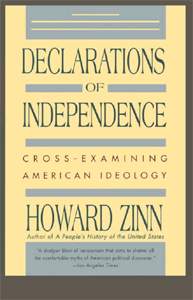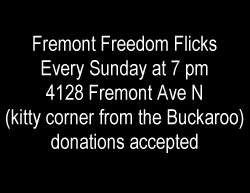 Sometimes
I get carried away. Like yesterday, when I wrote:
American history is 500 years of genocide, war, and police repression.
That's not giving this country enough credit. After all, a lot of good
people lived and live here, and there are a lot of bright spots in US history.
(Paradoxically, this might be one of them, insofar as there is a growing
movement of people who are fed up with the status quo and are taking positive
steps to change things.) What I really meant was this: The history of
American government [from conquerors to colonists to congressmen]
is 500 years of genocide, war, and police repression. This claim is
reinforced and substantiated by Howard Zinn's
Declarations of Independence: Cross-Examining American
Ideology, a book which kept me glued to the couch for hours. Its basic
premise is that social and economic injustice persist because Americans blindly
abide by a set of forced assumptions and inculcated beliefs which do not
accurately reflect present or historical reality. (This shouldn't be surprising
given that most of us are reared on government-approved text books in prison-like
institutions where unquestioning obedience is the primary value.) Sometimes
I get carried away. Like yesterday, when I wrote:
American history is 500 years of genocide, war, and police repression.
That's not giving this country enough credit. After all, a lot of good
people lived and live here, and there are a lot of bright spots in US history.
(Paradoxically, this might be one of them, insofar as there is a growing
movement of people who are fed up with the status quo and are taking positive
steps to change things.) What I really meant was this: The history of
American government [from conquerors to colonists to congressmen]
is 500 years of genocide, war, and police repression. This claim is
reinforced and substantiated by Howard Zinn's
Declarations of Independence: Cross-Examining American
Ideology, a book which kept me glued to the couch for hours. Its basic
premise is that social and economic injustice persist because Americans blindly
abide by a set of forced assumptions and inculcated beliefs which do not
accurately reflect present or historical reality. (This shouldn't be surprising
given that most of us are reared on government-approved text books in prison-like
institutions where unquestioning obedience is the primary value.) Through a series of topical essays, Zinn tries to set the record straight in the hope of inspiring his readers to transformative action. Either you're going to read it or you're not, but there is one concept I learned which I thought I should share here because it will be of practical use to anyone called to jury duty: Jury Nullification. It means that a juror is free to call on his or her conscience when deciding a case. For example, if a logging protestor who chained himself to a tree is on trial for criminal trespass, a jury sympathetic to his cause can find the defendant not guilty even if there is a clear violation of the letter of the law. This is because law and justice aren't necessarily the same thing. As Zinn explains it, the law is the general case (private property is off limits), whereas the idea of justice takes into account specific, extenuating circumstances (the survival of the planet overrides a person's right to decimate a life-sustaining forest, and thus the protestor's action is just). It's good to know that as a juror you are not bound to judge the action only in relation to the law as written, but this point might be moot given the precedent set by Bush administration in its illegal detainment of suspects at Guantanamo Bay and the provisions of the USA PATRIOT Act which could in almost any given case revoke a person's right to trial by jury. This is grim. The truth hurts, but candy-coated lies kill. The greatest impediment to functional democracy in the US today is that most people sustain themselves on a diet of candy-coated lies which saturate the commercial media. Symptoms of malnourishment include Bush/Cheney bumper stickers, driving gas-guzzlers (look at anyone in an H2 to witness a sugar coma), proud wearing of corporate advertisements in the form of logos (swooshes, professional sport team affiliations, etc.), and patronizing and/or maintaining investments in companies with known environmental and labor violations. Fortunately, substantive altenatives to big money infotainment are popping up daily. One phenomenon which is bringing people together to discuss and organize is grassroots community cinema. All you need is a dark room, a digital projector (less expensive every day), a VCR or DVD player, and some content (many independent political films specifically state they are in the public domain for license-free viewing). As an example I offer what is happening in my neighborhood every Sunday and the films which showed tonight.... |
|||
|



